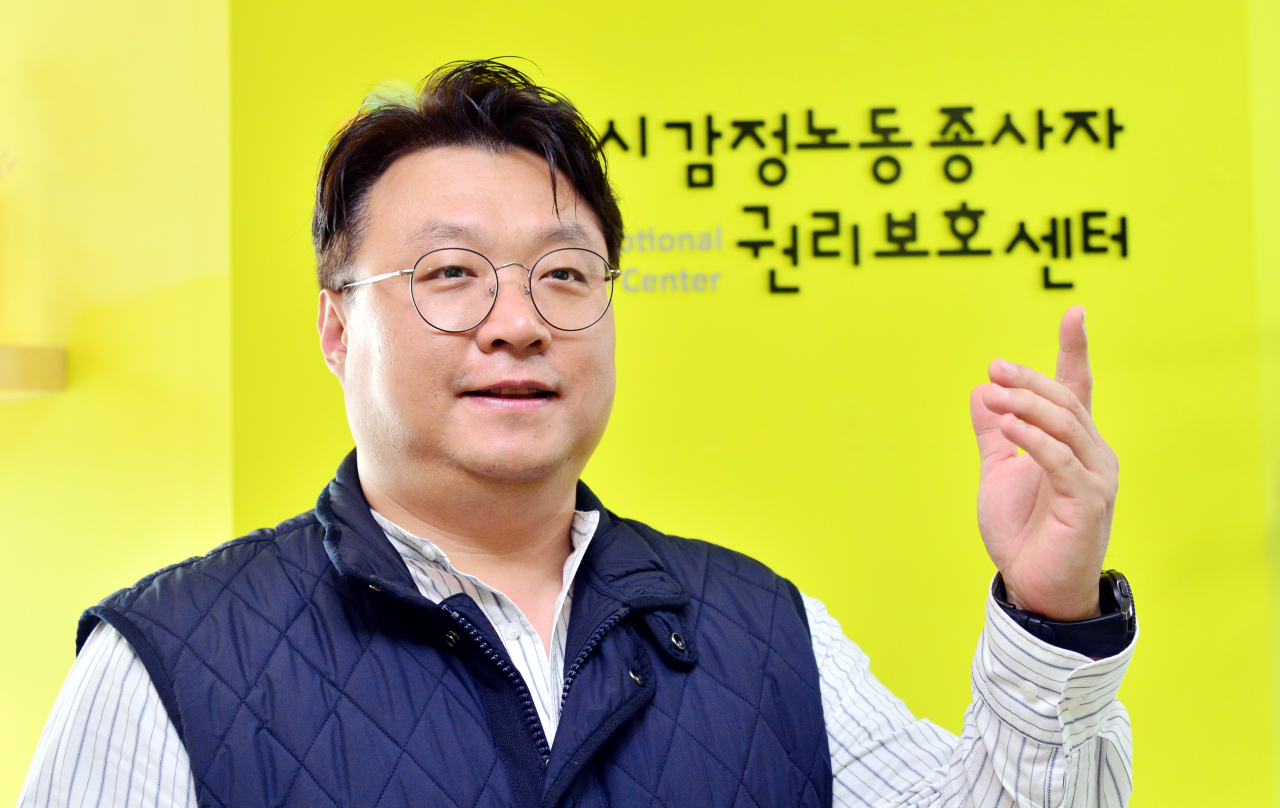South Korea has traditionally been known as “the courteous country in the East,” meaning Koreans prioritize politeness above other values.
The country’s service industry, however, reveals a strikingly different image of the country, as it grapples with customers on power trips at the expense of employees’ health.
The top-down power dynamic between customers and workers has created an environment that tolerates almost any behavior by customers and requires excruciating emotional labor on the workers’ side.
To tackle the widespread abuse, Seoul Emotional Labor Center CEO Lee Jung-hoon says as a short-term solution that customers who cross legal boundaries should be punished to send a warning to others.
“Some customers go out of control because they aren’t punished. Rather, business owners will give them gift certificates and other goods to stop them from filing a complaint. But if they were penalized for harassment, they would stop,” Lee said in an interview with The Korea Herald.
“Even without last year’s amendment to protect emotional laborers, abusive language and actions are punishable under the Criminal Act. Punishing customers for verbal and physical abuse will raise social awareness and (serve as a) warning,” Lee added.
Given the prevalence of emotional abuse, harassment is no longer an issue that can be dealt with by pleading to the good-hearted, he said.
In the wake of workers taking their own lives due to severe emotional abuse, legislators amended the Occupational Safety and Health Act in October last year to legally protect emotional laborers.
The revision mandates owners to protect employees from verbal and physical harassment. Failure to do so can result in a fine of up to 10 million won ($8,400).
Punishing customers for violating the law not only benefits employees but companies too, because they attract skilled workers who can offer improved customer service.
“Companies first need to modify their policies and strengthen workers’ rights. This, in parallel with better social awareness, will bring changes on-site,” Lee said.

Seoul Emotional Labor Center CEO Lee Jung-hoon (Park Hyun-koo/The Korea Herald)
The Seoul Metropolitan Government defines emotional labor as any form of labor that requires workers to suppress their feelings.
Workers who provide services to customers directly or indirectly -- including call center operators, nurses and care workers -- are often classified as emotional laborers as they are forced to remain polite and put on a smile at all times.
“Morticians are also emotional laborers. Even on days they are happy, they have to remain serious. The same goes for judges, who have to stay neutral,” Lee said.
There are about 7.4 million emotional laborers, accounting for 43.5 percent of the total labor force, according to data from the Ministry of Employment and Labor.
Some 43 percent of emotional laborers report having experienced emotional abuse and 26.6 percent struggle with depression, research by Korea University College of Medicine showed.
According to Lee, there are a number of factors that lead people to accept behaviors that overstep the boundaries, resulting in distressing emotional labor.
“Customer-centered management and marketing strategies used by companies is a reason. The quality of products are mostly similar, so customer service and customer relations have become variables in earnings, which entails unconditional politeness and apologies. Some customers who have become accustomed to this think they have a right to such (unconditional) service,” Lee said.
“As South Korea becomes increasingly individualistic, people feel a growing urge to feel a sense of relative superiority. In reality, it is difficult for such urges to be fulfilled. Consequently, people take the opportunity to express and feel superiority as a customer,” Lee added.
Lee mentioned Hyundai Card as a prime example of a company that has seen an upgrade in the quality of its service since taking steps to protect its call center agents.
In 2012 Hyundai Card implemented a policy that allows workers to end phone calls if customers use abusive language. Call center agents are to give out warnings, which vary depending on the severity of the abuse, and hang up the phone if the harassment continues.
After adopting the policy, the proportion of consultants with high performance ratings rose to 58 percent in 2017, compared with 39 percent in 2012, the company said.
Some 54 percent of Hyundai Card call center agents said the policy had reduced stress levels and 79 percent said it had helped them provide better service.
“They (workers) no longer have to answer the phone in fear of the person on the other end of the phone,” Lee said.
The Seoul Emotional Labor Center, operated by the Seoul Metropolitan Government, opened as an independent center in October 2018, and offers various programs to help workers struggling with emotional labor. They are available weekdays free of charge to workers residing in Seoul or whose companies are based in Seoul.
To reach out to as many workers as possible, the center is open until 9 p.m. every Wednesday and Friday. Consulting psychologists also visit applicants who are unable to drop by any of the center’s four venues in Seoul.
Applicants can register for service online at
www.emotion.or.kr or via phone 02-722-2525.
By Kim Bo-gyung (
lisakim425@heraldcorp.com)






